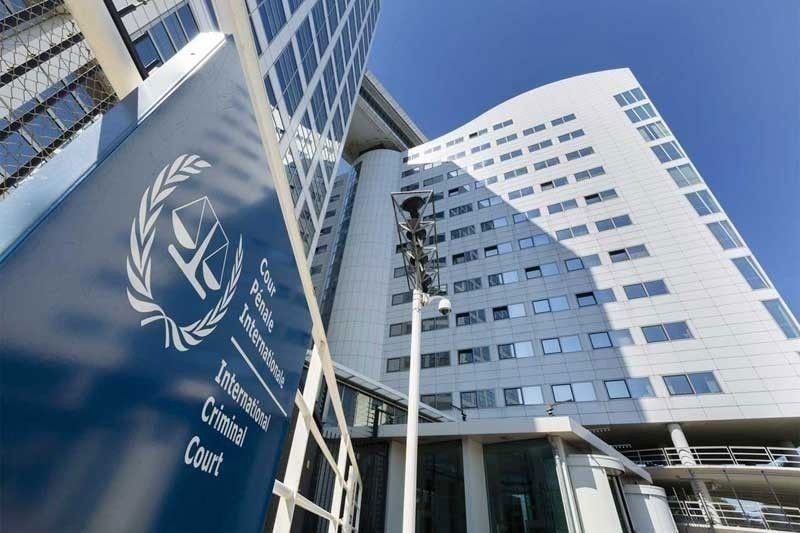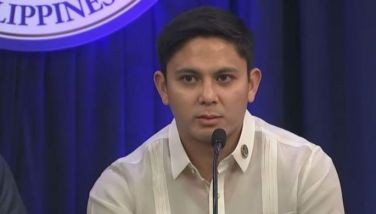Palace: ICC statement political propaganda

MANILA, Philippines — The International Criminal Court (ICC) prosecutor’s statement on the war on drugs is just “political propaganda” that would not affect Philippine government affairs, officials said yesterday.
In a report released last Tuesday, ICC prosecutor Fatou Bensouda said there is “reasonable basis” to believe that crimes against humanity such as murder, torture and infliction of serious physical injury and mental harm were committed in the Philippines in connection with the government’s drug crackdown.
Bensouda added that her office is expected to decide on whether to seek authorization to open a probe on the Philippine situation in the first half of next year.
“The report, or more appropriately, a political propaganda against (President Duterte), is not only irrelevant to the Philippines, but immaterial as well to the affairs of the country’s government,” chief presidential legal counsel Salvador Panelo said in a statement.
“This is so, since the ICC, as we have repeatedly expounded, does not have jurisdiction over the Philippines, nor any of its state officials, given that the Rome Statute failed to comply with the publication requirement, demanded by the fundamental principle of due process under our Constitution, more so because the Rome Statute is penal in nature,” Panelo added.
The Rome Statute is a treaty that formed the ICC. The Philippine Senate ratified the treaty in 2011, but Duterte withdrew the country from the statute in 2018 after the ICC announced a plan to look into his anti-narcotics campaign.
Presidential spokesman Harry Roque said the ICC would not have an impact on the Philippines’ economy and trade relations.
“We don’t see (any effect)... The (ICC) examines the criminal responsibility of the individual, not that of the state. So it won’t have an effect on the country because what they are saying is that the individual should answer (the charges), not the state,” Roque told radio station dzBB yesterday.
“That is the exception to the rule. Normally, international tribunals deal with issues involving states. This is one of the few mechanisms where an individual can be held to account,” he added.
The Palace spokesman maintained that waging a war on narcotics is not a crime. He reiterated that the ICC had rejected a request to begin an investigation on the alleged crimes in Afghanistan because the parties involved were uncooperative.
“With regard to what they called crimes against humanity, one of the elements is the intention to kill civilians. We do not have such an intention because the war on drugs is a policy, a police action recognized worldwide. No nation in the world, even the United Nations, claims that a war on drugs is wrong,” he said.
Roque claimed that Bensouda is just politicking and that her statement was just meant to disprove claims that she only criticizes fellow Africans.
“Bensouda is just trying to impress her fellow Africans now that her term is about to end, and it seems that she is engaging in politics in Africa, in her country. We won’t allow ourselves to be used as an instrument for her politicking,” Roque said.
For Panelo, the celebratory statements of Duterte’s critics are “premature” and “amusing” because there is no conclusive decision yet on whether the ICC should proceed with an investigation.
“Even assuming that the Rome Statute became enforceable in the Philippines (which never did), the ICC cannot exercise its powers on our local matters since our formal ‘withdrawal,’ which took effect in March last year, removed our country from its jurisdiction,” the President’s chief legal counsel said.
“With no authority to proceed, it becomes clearly evident that what Ms. Bensouda and her office are doing is playing politics in an attempt to besmirch the reputation and popularity of President Duterte – akin to the practices of other lowly vulnerable and biased international rights groups, which accept unthinkingly and without basis the lies peddled by the dyed-in-the-wool opposition detractors,” he added.
Panelo also argued that the Philippine judicial system is robust enough to conduct criminal proceedings brought before the courts.
Wrong info?
The government’s chief anti-narcotics officer yesterday blamed Vice President Leni Robredo and other members of the opposition for the adverse findings of the ICC on the government’s war on drugs.
Breaking his silence on the issue, Philippine Drug Enforcement Agency (PDEA) director general Wilkins Villanueva pointed to Robredo and other critics of the administration for the wrong information the ICC had received about the government’s anti-drug campaign.
“If you will remember, it was the Vice President that gave… allegations on these (extrajudicial killings),” Villanueva said in mixed English and Filipino in a phone interview.
In a video message to the UN Commission on Narcotic Drugs in 2017, Robredo criticized Duterte’s drug war for the spate of extrajudicial killings under his watch.
Robredo only sought data from government officials after her speech which already affected the image of the anti-drug campaign, according to Villanueva.
“She had already delivered a speech. That served as the predicate of the investigation,” Villanueva said.
Cause-oriented groups and other critics, according to the PDEA chief, were also to blame for giving figures on the death toll, which are way higher than the government’s official data of at least 5,942 fatalities since 2016. Among these groups is Human Rights Watch, which documented at least 22,000 drug-related killings.
“What we have are the real numbers. We dwelled on those because those are the validated figures,” he said.
Meanwhile, the Philippine National Police (PNP) dared the ICC to show proof that law enforcers are committing human rights abuses in the drug war.
‘Greater responsibility, accountability’
The Commission on Human Rights (CHR) has called on the government to acknowledge and address the observations of Bensouda on cases of human rights violations in the Philippines.
Reacting to the ICC prosecutor’s latest report, the CHR also called for greater transparency and accountability from the Philippine government in addressing cases of human rights violations in the country.
“The primary responsibility to respect, protect and fulfill the rights of individuals remains to be with the state, which exists as a modern instrument to balance both individual and social welfare,” the commission said.
“Thus, the government is called upon to squarely address all the violations that have resulted from the campaign against illegal drugs,” it added.
In its latest statement, the CHR reiterated its commitment to support domestic and international protection mechanisms to ensure that human rights violations are addressed and perpetrators are held to account.
“We remain vigilant and will continue to condemn actions that threaten the peace and security of the people, whether committed by state or non-state actors,” it said.
The commission had earlier pronounced that it was ready to cooperate with the ICC prosecutor should she request assistance from the human rights body.
The Duterte administration has repeatedly maintained that the international body no longer has jurisdiction over the Philippines.
Despite the country’s withdrawal, however, Bensouda’s office said the ICC retains its jurisdiction over crimes committed during the time in which a state was party to the treaty – in the case of the Philippines, between November 2011 and March 2019.
‘Reasonable bias’
Meanwhile, Surigao del Norte Rep. Robert Ace Barbers, who chairs the dangerous drugs committee of the House of Representatives, noticed that the ICC report prepared by Bensouda on the government’s anti-drug war seems to be “grossly wanting from facts.”
“How can there be reasonable basis when Prosecutor Bensouda admits that she has yet to ‘open an investigation into the situation in the country in the first half of 2021.’ It’s full of propaganda,” Barbers said.
The senior administration lawmaker argued that no less than the ICC prosecutor herself “admits that her study is based on ‘available information,’ which obviously means information provided by the complainants (in the drug war).”
“Clearly, the story is one-sided and the findings are premature at most,” he said. “If this is the quality of investigation that we expect from her, then we cannot expect justice at all. At best, the report reflects her ‘reasonable bias’ against President Duterte.”
As far as the left-wing Makabayan bloc members – composed of Bayan Muna Reps. Carlos Isagani Zarate, Ferdinand Gaite and Eufemia Cullamat; ACT Teachers party-list Rep. France Castro; Gabriela Women’s Party Rep. Arlene Brosas and Kabataan party-list Rep. Sarah Elago – are concerned, it is a vindication.
“This is a step toward holding President Duterte accountable for his crimes against humanity as commander-in-chief. There will be no impunity for him and his cohort of executioners,” they said in a joint statement.
“(Duterte) cannot escape justice for the tens of thousands of Filipinos slaughtered at his behest. The ICC findings confirm our longstanding criticism against Duterte and his regime,” they added. – Emmanuel Tupas, Janvic Mateo, Delon Porcalla
- Latest
- Trending




























